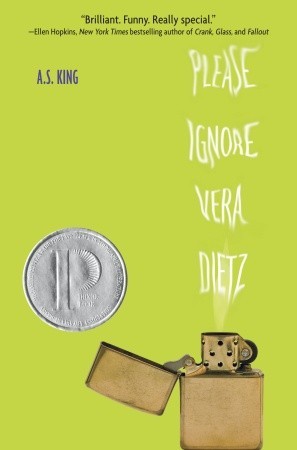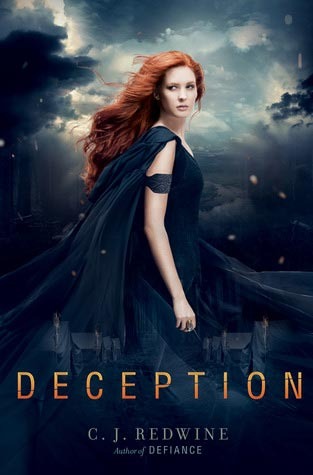
To explain why I read this book, I must first tell you a story. Gather round, children.
This year I’ve set a somewhat lofty goal for myself. Somehow, using logic I can’t quite work through anymore, I decided that I was totally up for running a half marathon with three other friends. Nevermind that I’ve never been much of a runner, and that last year my year-long goal was to be able to run a 5K over Thanksgiving. I spent a year training my body to be able to run three miles. And then this year, my brain was all, “Hey, if I can run three miles, what’s another ten?”
Brain, you suck.
So anyway, I’ve been training for the past few months to try to whip my horridly reluctant body into shape for this race, and something I learned early on is that I’m not a fan of running to music. Besides the fact that my playlist gets repetitive after days of running to the same music, seven years of marching band has trained me that I must step on the beat. My feet don’t really give me a choice in the matter. And you know what? Very few songs, even upbeat ones, are performed at my ideal running tempo.
So instead I turned to audio books. I’ve never been an audio books person before, but they seemed the perfect distraction/reward to take my mind off the miles passing underfoot. And they work wonderfully. I still don’t enjoy running (although I don’t loathe it quite so much as I did when I first started), but once I find my rhythm, I’m able to sink into the book and tune out the pavement and the breathing and the sweat. (Okay, not the sweat. There is no ignoring the sweat.)
Being cheap, I get my audio books in digital form from the library, and the only problem with that is that the selection is somewhat limited, and there is often a waiting list. So I’m constantly putting multiple audio books on hold, in the hopes that by the time I finish one, I’ll have progressed to the front of the queue for another. The problem with this is, sometimes I finish a book and none of the others on my list are available, and I’m left drifting and bookless and alone.
The last time this happened, I put out a plea on Twitter for someone to suggest an audio book that was:
A) Good (Because running is hard enough without running to a bad audio book)
B) Popular enough that my library would probably have it
C) Under-the-radar enough that it would be available for check out right now
Kind of a tall order, but I had several helpful Twitter followers suggest a few titles, including one I’d never heard of, Please Ignore Vera Dietz by A.S. King. However, I was desperate, and she swore it was fantastic, and HEY, the library had it available for instant digital download. Score. I loaded it onto my phone, threw on my running shoes, and headed out the door, wondering what kind of book I was getting myself into. I often know very little about a book when I start it, but this time I knew literally nothing except the title. Eep.
Fortunately, the book lived up to its promise.
The Plot (from Goodreads):
Vera’s spent her whole life secretly in love with her best friend, Charlie Kahn. And over the years she’s kept a lot of his secrets. Even after he betrayed her. Even after he ruined everything.
So when Charlie dies in dark circumstances, Vera knows a lot more than anyone—the kids at school, his family, even the police. But will she emerge to clear his name? Does she even want to?
My Thoughts:
Please Ignore Vera Dietz is one of the more uniquely crafted tales I’ve read. First of all, the bulk of the story is told by Vera, but occasionally we get another point of view, and none of them are your run-of-the-mill YA narrator. One is her dead ex-best friend, Charlie. One is her dad. And one is a building. Yup, that’s right, a building. And strangely, even with an adult POV and an inanimate object POV, it works.
Then there’s the structure of the story, which oscillates between the present narrative, several months after Charlie’s death, and the past, jumping around from the time Charlie and Vera were small to the weeks leading up to his death. Even though the story is told in an extremely non-linear fashion, following more a stream-of-consciousness than logical chronology, I didn’t find it hard to follow at all. It made sense. An event would happen, and it would remind Vera of a memory, which we would view through her eyes. Or Vera would wonder why something happened, and we’d flash to her dad or Charlie, giving a perspective Vera never knew about.
There’s also the barest hint of the supernatural, with Charlie observing Vera from beyond the grave, and eventually, seeming like he still has some sway on the outside world. But it’s subtle, and this is by no means a paranormal story. Charlie and Vera each have their own interpretations of what’s happening, and it’s up to the reader to decide what to make of it.
Digging into the story itself, I thought it was a beautiful examination of so many big issues, each of which was handled with care and presented thoughtfully, without making this seem like a Big Issues Book. There’s the obvious one: the death of a friend. But there’s also the betrayal of a friend, and the perils inherent in navigating the treacherous waters of trying to keep a friend from childhood through the teen years. There’s alcoholism, viewed from the perspectives of a person in recovery and a person on the brink. There’s romance, and all the various ways teens approach flirtation and dating and jealousy and sex. There’s abandonment by a parent, the struggle of a single parent, and the tension between a parent trying to protect his child from the mistakes he made, and the teenage girl yearning for the independence to make her own mistakes.
And those are just the main plot points. There’s a bunch more Big Issues that arise in the subplots, and though that may seem like way too many Big Issues for one book, they’re handled masterfully, so they all play off each other and interconnect in a way that seems balanced and real. Honestly, until I typed them out right now, I didn’t realize just how many Big Issues there were. It seemed organic and natural, giving good perspectives and making some excellent observations without ever once giving even the slightest hint of being preachy.
The characters were treated with equal deftness. Vera was a wonderful narrator. She was smart and sassy and funny, but she also had her share of insecurities and doubts. She screwed up in some pretty major ways without it ever feeling like she had to screw up for the sake of story. All her choices felt like things she would really do, even though she was a smart kid and some of her decisions were pretty terrible. Because sometimes smart, good kids make bad decisions. And this book does an excellent job of exploring why. I was totally sucked in by her story, her history with Charlie, and how she was dealing with his death.
Then there was Charlie, who did some pretty rotten things before he died, but who is never a completely unlikable character. He explains some of his more abhorrent activities without really making excuses. Mostly, Charlie regrets the choices he made that hurt Vera and led to his death, and works to make the reader understand why those choices seemed necessary at the time, even if he wishes now he could take them back. Charlie’s story is a sad one, and it seemed his whole life was a series of trying to make the best of the terrible hand he was dealt — and sometimes he failed. Big time. His sections do an excellent job of providing explanations, not excuses, and they made me really feel for this screwed up kid.
The biggest surprise in this book is Vera’s father, Ken. He starts out as your typical YA parent — overprotective and clueless. The kind of YA parent that I think is way overused (and only marginally better than the Dead YA Parents) and always leaves me frustrated. But through the inclusion of his POV, we’re able to see why he treats Vera the way he does, his struggles, his aspirations for her life. And although this is YA and he is an adult, he goes through a coming-of-age arc of his own, as he fights with his own inner demons to try to give his daughter the life he never had. I really love that he was treated so thoughtfully as a character, and that the reader was able to understand his perspective. I wish more YA books took the approach of presenting the parents as real people, and took the time to explore the often-strained relationship between teens and their parents from both sides of the coin. I understand that teens aren’t necessarily chomping at the bit to read a story told in the voice of their parents, but if it’s handled well, as it is in this book, I think it really enhances the story, no matter the age of the reader.
Overall, Please Ignore Vera Dietz is a beautifully constructed tale of love, friendship, loss, and betrayal, with a varied cast of wonderfully realized characters who really brought the story to life. It tackles a myriad of tough issues, any one of which could bog a lesser book down, with grace and aplomb. It’s in turns funny and poignant, thoughtful and carefree, and one of the most unique and well-executed books I’ve read in a while.







